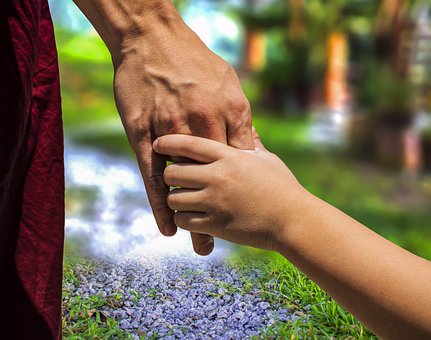Guiding Children Through Grief and Loss

What You Hang On To After Losing a Child
September 30, 2016
Riding The Waves of Grief
July 11, 2017
When someone who we love dies it creates an array of complicated emotions which take time to process. Coming to terms with loss and grief can be even more difficult for children, whose minds are not yet fully developed. Many of them have never experienced such a loss before, and that can make it even more frightening and overwhelming. Children need the love and support of caring adults to help them navigate through this new territory, and this article has some tips to help both of you as you help each other.
First of all, it is important that we talk to children about death. This is not an easy subject for many. How you talk to them will be dependent on their age, but in general it is important to keep the discussion in honest, simple terms that a child can understand: “Grandpa had an illness that was too much for his body, but don’t worry, people don’t die every time they get sick.” Also, don’t use confusing expressions like “they fell asleep” or “Nana is gone.” Young children think in literal terms, and this can confuse and upset them. An adult whose mother passed away when she was eight years old shared her personal experience: “They told me my mom was gone, but I remember thinking that they lied. She was lying right there in that box!” She then spent the entire rest of the visitation wondering why her mother didn’t wake up, since the adults had also told her that her mother was “asleep.” Telling a child that death is like “going to sleep and never waking up” is a confusing analogy, and may make them afraid to go to bed at night.
The website Kids Health has an article with helpful suggestions about guiding children through grief, including this tip: “…remember that kids’ questions may sound much deeper than they actually are. For example, a 5-year-old who asks where someone who died is now probably isn’t asking whether there’s an afterlife. Rather, kids might be satisfied hearing that someone who died is now in the cemetery. This may also be a time to share your beliefs about an afterlife or heaven if that is part of your belief system.”
Let children ask questions, and don’t make them feel guilty for asking about a certain subject because it is too painful or “taboo.” Sometime adults use the excuse that we don’t want to talk to our child about a certain subject because we think it will be too hard for them, when sometimes it is really just too hard for us. Don’t change the subject or tell them, “We don’t talk about that.” Remember that unresolved inner conflicts have a way of resurfacing. Talking about our feelings and about difficult subjects is a step towards healing, and can help us process our thoughts and understand complicated emotions. It’s okay to tell them you don’t have all the answers.
We should be honest with children about even the difficult things, and allow them to be honest with us. This doesn’t mean allowing them to know details that are not appropriate for a child, but it does mean letting them see that is okay to not be okay. Death is sad, and it is not a sign of weakness to allow your children to see you be sad. It is also okay to be angry, or confused, or even numb. Give your child time and a safe space to express their emotions, whatever they may be. Let them know that they can talk with you whenever they need it. Be patient with them. Also realize that some emotions may come out in unexpected ways, like anger that seems unprovoked. Validate their feelings; help reassure them when they feel confused by or not in control of their own emotions. Help them find healthy ways to express their thoughts and feelings.
It is also important that we include our children in the process of saying goodbye. If they are old enough to love they are old enough to grieve, so there is no reason that they should not be involved. The ritual of honoring departed loved ones and laying them to rest can be an important step in helping a child heal, and helps them understand that death is a part of the cycle of life. It can also be confusing and even frightening, so it is important to allow them to ask questions to help them understand and feel safe. Children have vivid imaginations, so if you don’t explain certain things or allow them to participate in the rituals their brains may fill in the gaps. What they imagine can be more confusing and frightening than reality. Instead explain it in terms they can understand, and if you have religious beliefs talking about those can help. Before a visitation or funeral talk with them ahead of time about what they should expect, what they will see, and what everyone will be doing. This can help them be prepared and give them an opportunity ahead of time to ask more questions. Also, if the child has not been to the location of the visitation or funeral service before, taking them there prior to the event may help them get comfortable with their surroundings before they face a time of great emotional intensity.
Children take their cues from you. If you treat death as terrifying and something that they must be shielded from that may create an unnatural fear that can last their whole lives. If you act like it is too hard for them to handle they will believe you, but if you empower and help guide them through it they can experience their grief in a healing way. Some supportive things you can do include finding ways for them to participate in a service or helping them say goodbye. If there is an open casket visitation do not force them to look at the body of a loved one, but do not prevent them. They could say a prayer next to the casket, place a note inside, or put a flower on the gravesite. Don’t be afraid that it will become the only way they will remember their loved one. What will stick with them are the memories of happy moments shared together.
Most importantly, help children remember their departed loved ones. Say their names, share stories, look at pictures. Create your own rituals to help honor those you have lost and to preserve their legacies in the years to come.
Two books that may be helpful in explaining death to children are, “The Fall of Freddie the Leaf,” and “Help Me Say Goodbye.” There are many other resources available, but the most crucial resource is YOU. Be a safe, caring presence for the children in your life. Grief is a process, but something they don’t have to go through alone. Find strength in loving and supporting each other, and in cherishing memories of those you have lost. Love is what binds us, and we are stronger if we hold on to one another.
~Jennifer Roberts Bittner
Funeral Celebrant/Life Tribute Specialist
Morrissett Funeral and Cremation Service
6500 Iron Bridge Rd.
N. Chesterfield, VA 23234
Serving the Richmond area since 1870



